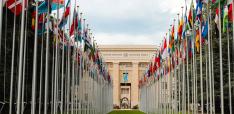Let’s Not Give Up on Hong Kong’s “Lost Generation”

Martin Miszerak and Bruce VonCannon argue that Hong Kong's youth are the key to its democratic future.
One bizarre spill-over from the recent Hong Kong protests was the adoption by the US Congress in November 2019 of The Hong Kong Human Rights and Democracy Act, which enshrined into law the US interpretation of the protests as a “crusade for democracy.” While not delivering any concrete benefits to the protesting youth, the law is underpinned by a failure to understand the true origins of the protests.
The view that Hong Kong and Beijing governments have somehow conspired to overturn “democracy” in Hong Kong is widespread in the United States, but it reflects a lack of understanding of Hong Kong’s history. A more nuanced, fact-based interpretation is furnished in the book Status Anxiety. Hong Kong’s Crisis of Identity, authored by one of us (Bruce VonCannon) and released last year.
The fact is that ever since its founding in the 1840’s, Hong Kong has never enjoyed “democracy” as that term is generally understood today in the West. Under the British colonial rule, Hong Kong was under “direct rule,” standing in sharp contrast to the “dominion” model (Australia, New Zealand, Canada, and South Africa) which bestowed home rule and a much greater level of democracy, but was reserved for the majority white or white-ruled colonies. As the latter model is much more familiar to Americans from neighbouring Canada, they tend to associate British rule with “democracy.”
The essence of British governance in Hong Kong was transferred to Hong Kong SAR in 1997 under the “one country, two systems” model, along with the “rule of law” associated with British legal and constitutional tradition. The co-existence of “rule of law” with the absence of democracy illustrates a political system which is not part of the American tradition and therefore difficult for most Americans to understand, despite major precedents in recent history (e.g. Imperial Germany in the 1870-1914 period). As a result, it is easy for Americans to jump to the conclusion that “democracy” must have been somehow “repressed” in Hong Kong.
The Hong Kong protests were ostensibly triggered in June 2019 by a proposal by the Hong Kong government to allow extradition from Hong Kong to Taiwan (and presumably the mainland) pursuant to an alleged murder committed in Taiwan by a Hong Kong man. In response to the mass protests, the extradition proposal was scrapped. However, to paraphrase Mao Zedong, a “single spark” thrown off in Taiwan started a “prairie fire” of passion-inflamed youth pouring uncontrollably into Hong Kong streets. While there is no doubt that many protesters shared a desire for greater democracy, we subscribe to the view, elaborated in Status Anxiety, that the main driver of the protests has been a deep alienation within Hong Kong’s “Lost Generation,” or youths born after 1997. While a complex phenomenon, the alienation can be ascribed to two fundamentals: income inequality and failures in educational system.
Hong Kong’s income inequality as measured by the Gini coefficient (0.473) is higher than in any G-7 country. (Ranging from zero to a maximum of 1.00, the higher the Gini coefficient, the higher the income inequality). The most egregious aspect of income inequality is the lack of affordable housing. Over 50 percent of Hong Kongers live in some form of public housing, where monthly rent for subdivided lodgings the size of an average car parking space can be well above US$700. Contrary to public perception, the problem is not rooted in lack of land supply, but rather in an excessive percentage of the available land being auctioned off to local real estate tycoons due to excessive government dependence on revenues from land sales to developers.
The other main reason for the alienation stems from educational failures in Hong Kong’s public school system. As the main language spoken by Hong Kongers remains Cantonese, a dialect of southern China, the public schools persist in bilingual instruction in Cantonese and English, resulting in most graduates lacking proficiency in Mandarin. This in turn creates a major handicap for them in the local job market which is now shaped by services for Mandarin-speaking mainlanders, both companies and individuals.
What should the Hong Kong and Beijing governments do then to advance the inclusion of the “Lost Generation?” While the Hong Kong government must take the lead, both governments must work in tandem if they are serious about addressing the economic and social headwinds which underlie the protests.
First, a much more forceful policy is required to make housing more affordable to a larger strata of Hong Kong residents. The supply of affordable public housing must be expanded by scaling down privatization to developers, as well as by rezoning land that was originally intended for non-housing purposes. Under the existing land supply projects, new public housing will not become available for occupancy before 2023. However, this delay could be mitigated through more immediate access to more affordable housing in Shenzhen, depending obviously on the openness of the Beijing government towards a more “commuter-friendly” border policy.
Just like public housing, Hong Kong public education requires urgent reforms in the sphere of language teaching. Mandarin teaching must be made mandatory in secondary schools, while a broader Mandarin-teaching online effort ought be subsidised. This does not of course imply that Cantonese teaching in public schools should be abandoned, which would be unwise from either political or cultural points of view.
The inclusion of the “Lost Generation” should be of utmost priority for both the Hong Kong and Beijing governments. Otherwise, the “prairie fire” of uncontrolled protests by alienated youth will not be extinguished, notwithstanding the national security law, putting at grave risk the future of both Hong Kong’s prosperity and rule of law.
Martin Miszerak is a Lecturer at Business School of Renmin University in Beijing, an adviser to private equity funds, former CEO of a government-sponsored restructuring fund in Poland, and former privatization adviser to the Polish government.
Bruce VonCannon is author of Status Anxiety. Hong Kong’s Crisis of Identity, published by Palmgrave McMillan in 2020, and investment adviser, and former CEO of Banque Privee Edmond de Rothschild in Hong Kong. He has lived in Hong Kong for over 25 years.


